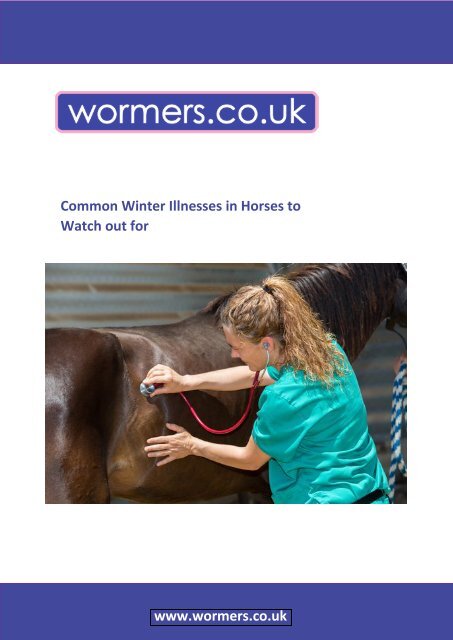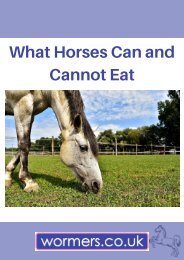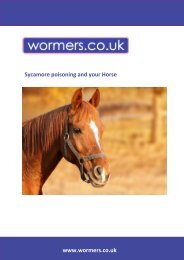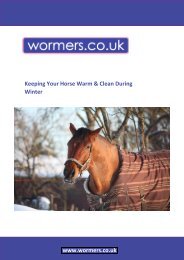Common Winter Illnesses in Horses to Watch out for
Winter can be a particularly rough time for horses if they are not cared for adequately, in this pdf we examine some of the ways these issues can be anticipated and in most cases prevented. Visit https://www.wormers.co.uk
Winter can be a particularly rough time for horses if they are not cared for adequately, in this pdf we examine some of the ways these issues can be anticipated and in most cases prevented. Visit https://www.wormers.co.uk
You also want an ePaper? Increase the reach of your titles
YUMPU automatically turns print PDFs into web optimized ePapers that Google loves.
<strong>Common</strong> <strong>W<strong>in</strong>ter</strong> <strong>Illnesses</strong> <strong>in</strong> <strong>Horses</strong> <strong>to</strong><br />
<strong>Watch</strong> <strong>out</strong> <strong>for</strong><br />
www.wormers.co.uk
For horses, w<strong>in</strong>ter is a particularly <strong>to</strong>ugh time<br />
of the year. They don’t have the com<strong>for</strong>t of a<br />
heated liv<strong>in</strong>g room <strong>to</strong> retreat <strong>to</strong>, and must<br />
<strong>in</strong>stead contend with a draughty stable. And<br />
it’s not just that the freez<strong>in</strong>g conditions can<br />
cause discom<strong>for</strong>t; w<strong>in</strong>ter is also a time where<br />
horses are at risk from many threaten<strong>in</strong>g<br />
diseases. Let’s exam<strong>in</strong>e some of the ways <strong>in</strong><br />
which these diseases might be anticipated<br />
and fought aga<strong>in</strong>st.<br />
Mud Fever<br />
This is a condition that’s often known as<br />
‘greasy (or cracked) heels’. It affects the sk<strong>in</strong><br />
around a horse’s feet, and is brought ab<strong>out</strong> by<br />
a specific sort of bacteria which thrives <strong>in</strong><br />
muddy, wet conditions. S<strong>in</strong>ce these<br />
conditions are more prevalent dur<strong>in</strong>g w<strong>in</strong>ter,<br />
so <strong>to</strong>o is mud fever.<br />
When the sk<strong>in</strong> rema<strong>in</strong>s wet <strong>for</strong> a prolonged<br />
period, spores of this bacteria will have time<br />
<strong>to</strong> germ<strong>in</strong>ate and grow tentacles which<br />
burrow <strong>in</strong><strong>to</strong> the sk<strong>in</strong>, produc<strong>in</strong>g an<br />
<strong>in</strong>flamma<strong>to</strong>ry response. This is usually quite<br />
easy <strong>to</strong> recognise – there will be matted hair,<br />
scabs, discharge and fissures on the sk<strong>in</strong><br />
around the feet. The horse might even<br />
eventually go lame.<br />
The condition can be treated by mov<strong>in</strong>g the<br />
affected horse <strong>in</strong><strong>to</strong> a clean and dry<br />
environment, and apply<strong>in</strong>g lotions or<br />
bandages <strong>to</strong> the <strong>in</strong>fected area. The area will<br />
need <strong>to</strong> be thoroughly washed and dried –<br />
and full recovery might take weeks. It’s best<br />
then <strong>to</strong> avoid the problem <strong>in</strong> the first place by<br />
keep<strong>in</strong>g your horse’s feet clean after they’ve<br />
been graz<strong>in</strong>g on wet ground.<br />
Chronic Obstructive Pulmonary<br />
Disease<br />
Chronic Obstructure Pulmonary Disease (or<br />
COPD or ‘heaves’) is an allergic reaction of the<br />
lung.<br />
It causes the t<strong>in</strong>y channels <strong>in</strong> the lung <strong>to</strong><br />
contract, mak<strong>in</strong>g it more difficult <strong>for</strong> the<br />
animal <strong>to</strong> breathe. Often, this will result <strong>in</strong> a<br />
lack of energy – which may be particularly<br />
apparent when the horse is be<strong>in</strong>g exercised.<br />
Dur<strong>in</strong>g w<strong>in</strong>ter, the most likely responsible<br />
allergen are the fungal spores found <strong>in</strong> hay,<br />
and the dust that collects on a stable floor.<br />
Consequently, it’s thought that stabl<strong>in</strong>g the<br />
animal dur<strong>in</strong>g w<strong>in</strong>ter will heighten the risk of<br />
an allergic reaction occurr<strong>in</strong>g.<br />
In order <strong>to</strong> diagnose COPD, an endoscope<br />
must often be passed through the horse’s<br />
m<strong>out</strong>h, and a small amount of fluid collected<br />
from the lungs. In particularly severe cases it<br />
might be necessary <strong>for</strong> the horse <strong>to</strong> be<br />
medicated – but it’s mostly sufficient <strong>to</strong><br />
simply remove potential allergens by clear<strong>in</strong>g<br />
the stable of cobwebs and dust with a vacuum<br />
cleaner, and mak<strong>in</strong>g the switch <strong>to</strong> vacuumpacked<br />
hay and straw that’s less prone <strong>to</strong><br />
harbour<strong>in</strong>g allergens.<br />
Arthritis<br />
Older horses are at an <strong>in</strong>creased risk of<br />
arthritis, a degenerative disease which causes<br />
the cartilage surround<strong>in</strong>g the horse’s jo<strong>in</strong>ts <strong>to</strong><br />
wear down. While there are many different<br />
<strong>for</strong>ms of arthritis, they all share one common<br />
feature: they make it more difficult <strong>for</strong> a horse<br />
<strong>to</strong> move around.<br />
This is especially troublesome dur<strong>in</strong>g w<strong>in</strong>ter,<br />
when a horse might need <strong>to</strong> move around <strong>to</strong><br />
keep warm. In the case of older horses, then,<br />
you might wish <strong>to</strong> give them a blanket dur<strong>in</strong>g<br />
the w<strong>in</strong>ter <strong>to</strong> help keep warm. This should be<br />
used spar<strong>in</strong>gly, s<strong>in</strong>ce there are many sk<strong>in</strong><br />
conditions which prolonged blanket use can<br />
heighten – as you’ll be creat<strong>in</strong>g a pocket of<br />
warmth and moisture <strong>in</strong> which bacteria can<br />
thrive.<br />
www.wormers.co.uk
While we can’t say <strong>for</strong> sure, it’s likely that<br />
arthritis pa<strong>in</strong> is worse <strong>for</strong> horses dur<strong>in</strong>g w<strong>in</strong>ter<br />
– as many arthritic humans have reported<br />
that their symp<strong>to</strong>ms get worse when the<br />
weather gets cold. S<strong>in</strong>ce it’s important <strong>for</strong> an<br />
arthritic horse <strong>to</strong> rema<strong>in</strong> as active as possible,<br />
you might there<strong>for</strong>e apply anti-<strong>in</strong>flamma<strong>to</strong>ry<br />
medication, <strong>in</strong> order that the pa<strong>in</strong> be bearable<br />
enough <strong>for</strong> the horse <strong>to</strong> move around.<br />
Cush<strong>in</strong>g’s Disease<br />
If your horse beg<strong>in</strong>s <strong>to</strong> develop a shaggy coat<br />
and an <strong>in</strong>satiable thirst, then the chances are<br />
high that they’ve developed Cush<strong>in</strong>g’s<br />
disease. This condition is caused by a tumour<br />
grow<strong>in</strong>g on the pituitary gland, which, as it<br />
grow, will upset the balance of the hormones<br />
<strong>in</strong> the body. The most troubl<strong>in</strong>g of these<br />
hormones is cortisol, a stress hormone which<br />
<strong>in</strong> excess can br<strong>in</strong>g ab<strong>out</strong> a number of<br />
damag<strong>in</strong>g effects.<br />
Cush<strong>in</strong>g’s disease is more likely <strong>to</strong> develop <strong>in</strong><br />
ponies than it is horses, and it mostly effects<br />
older animals. It can cause weight loss, ulcers<br />
and lam<strong>in</strong>itis, <strong>to</strong> name but a few symp<strong>to</strong>ms.<br />
Affected horses will require careful<br />
management if they’re <strong>to</strong> get through the<br />
w<strong>in</strong>ter unscathed.<br />
Bees<strong>to</strong>n Animal Health Ltd.,<br />
Whitchurch Road,<br />
Bees<strong>to</strong>n Castle,<br />
Tarporley,<br />
Cheshire,<br />
CW6 9NJ<br />
www.wormers.co.uk
www.wormers.co.uk









